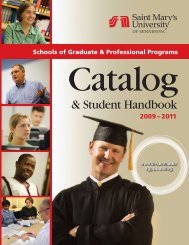PDF version - Saint Mary's University of Minnesota
PDF version - Saint Mary's University of Minnesota
PDF version - Saint Mary's University of Minnesota
You also want an ePaper? Increase the reach of your titles
YUMPU automatically turns print PDFs into web optimized ePapers that Google loves.
Social Science<br />
HS496/497 Human Services Internship<br />
1-17 credits<br />
This <strong>of</strong>f-campus experience provides qualified juniors or seniors with opportunities to participate as<br />
members <strong>of</strong> established human services site teams. The student's academic advisor, in conjunction<br />
with the <strong>University</strong>'s Career Services <strong>of</strong>fice and on-site pr<strong>of</strong>essionals, provide supervision and guidance<br />
during the internship. Prerequisites: B200, B201, HS111, HS211, HS306, HS495, PY111, and PY211. Corequisite:<br />
HS498.<br />
HS498 Internship Integration 2 credits<br />
Students engage in evidence-based self-assessment and peer review as they synthesize pr<strong>of</strong>essional<br />
knowledge and skills during the internship. This course is <strong>of</strong>fered with a distance-learning experience to<br />
accommodate students completing geographically-distant internships. Co-requisite: HS496/497.<br />
Mass Communication Program<br />
Dean Beckman, M.S., Coordinator<br />
Mass communication students study and practice the conveying <strong>of</strong> information, ideas and opinions to<br />
various audiences. Students can choose between electronic publishing, journalism or public relations<br />
majors. Minors are also <strong>of</strong>fered in all three areas.<br />
Besides building communication skills, the mass communication programs emphasize the importance<br />
<strong>of</strong> ethical conduct by media practitioners. Students also learn about the historical and contemporary<br />
effects <strong>of</strong> media messages on the society at large.<br />
Because the mass media affect many aspects <strong>of</strong> a diverse contemporary society, students are<br />
encouraged to obtain a broad liberal education, choosing courses from disciplines such as English, art,<br />
business, political science, history, mathematics, sociology and psychology.<br />
General Goals for Learning<br />
Students :<br />
• Are able to write and present at a pr<strong>of</strong>essionally acceptable level for the mass media and public<br />
relations/electronic publishing fields;<br />
• Have the ability to be pr<strong>of</strong>icient at word processing, desktop publishing, and graphic design;<br />
• Are able to understand the effects <strong>of</strong> the mass media on individuals and society, and be conversant in<br />
ethical implications <strong>of</strong> media practices; and<br />
• Are able to apply current events to a deeper understanding <strong>of</strong> various communication techniques<br />
and media.<br />
Mass Communication Core:<br />
A. All <strong>of</strong> the following:<br />
AR103 Art Foundations<br />
AR303 Graphic Design I<br />
E295 Practical Grammar & Usage<br />
MC111 Introduction to Mass Communication<br />
MC201 Reporting I<br />
MC308 Editing<br />
MC488 Contemporary Issues in Mass Communications<br />
MC497 Internship (3 credits minimum)<br />
Electronic Publishing Major (41 Credits)<br />
Electronic publishing is an interdisciplinary course <strong>of</strong> study combining course work from five academic<br />
departments (mass communication, art, business, English and computer science). Electronic publishing<br />
strives to prepare students for careers in a variety <strong>of</strong> communication-related fields and capitalizes upon<br />
new technologies while grounding students in the liberal arts tradition.<br />
189 189
















